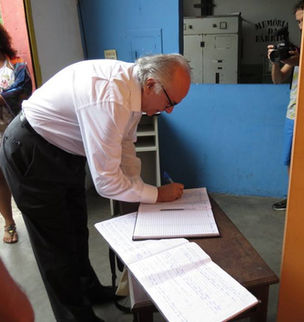
The Alice Project: For Future Memory
Between 2011 and 2016, I led a project funded by the European Research Council with a budget of €2,400,000. The project is presented below as it was in 2011. Once the project was successfully completed, according to the European authorities, I decided together with my team to turn it into a research programme, in the form of a working group, another programme among those already existing at the Centre for Social Studies (CES). This programme was in full swing until the defamation that affected me and two other important CES researchers, María Paula Meneses and Bruno Sena Martins, took place. In addition to the project summary, I present the most important minutes (some particularly important: IMP) of the meetings and activities that were drafted throughout the project. The minutes were drafted by researchers who were part of the project. Between 2017 and 2020, we focused on the production and publication of the project's books.
These documents reflect how the project was carried out, which later became a research programme. When it became a programme, a new WhatsApp group was created, from which I include messages between 2020 and 2022.Those who have the time and availability to analyse this extensive documentation (reproduced with data protection in mind) will conclude that it was a collective construction with moments of joy and tension, and that it was carried out with complete success. This reading may be particularly useful for new generations of social scientists.
ALICE
Strange mirrors, unexpected lessons:
defining a new way for Europe to share the experiences of the world
What are the project's objectives?
Alice is a research project led by Boaventura de Sousa Santos and funded by the European Research Council (ERC), one of the most prestigious and competitive international funding programmes for scientific research excellence in Europe.
The ALICE project aims to rethink and renew scientific and social knowledge in light of the Epistemologies of the South, proposed by Boaventura de Sousa Santos, with the aim of developing new theoretical and political paradigms for social transformation.
Europe and the Global North in general are affected by a feeling of intellectual and political exhaustion that translates into an inability to innovatively address the challenges of social, environmental, intergenerational, cultural and historical justice facing the world in the first decades of the 21st century. In contrast, the Global South, in its immense diversity, presents itself today as a vast field of economic, social, cultural and political innovation.
ALICE is based on the belief that social, political and institutional transformation can benefit greatly from the innovations taking place in the countries and regions of the Global South. However, this is a demanding undertaking that presupposes a willingness to engage in mutual learning, intercultural understanding and the search for political and ideological convergence, while respecting identity and celebrating diversity.
The project began in July 2011 and lasted five years, with the institutional framework of the Centre for Social Studies (CES) - Associated Laboratory of the University of Coimbra, Portugal (www.ces.uc.pt).
Who is on the team?
The international and multidisciplinary research team is made up of 12 researchers from different continents. The project also benefits from the collaboration of a larger group of researchers from the CES, as well as a wide range of social scientists, policy makers, activists and guest journalists.
What are the premises?
Understanding the world goes far beyond the European understanding of it. There is no shortage of alternatives in the world; what is lacking is an alternative way of thinking about alternatives. The diversity of the world is infinite and no general theory can encompass it. The alternative to general theory is the promotion of an ecology of knowledge in conjunction with intercultural translation.
What are the thematic areas?
Democratisation of democracy: New experiences of “high-intensity democracy”, as well as articulations between different forms of democratic deliberation, with a view to valuing demo-diversity.
Transformative constitutionalism, interculturality and state reform: Experimental and postcolonial constitutionalism, originating in popular struggles, which breaks with the assumptions of unity, uniformity and monoculturalism of the modern state.
Other economies: Diverse forms of non-capitalist economic organisation, with a view to building a new economic common sense and a plural economy.
Human rights and other grammars of human dignity: Human rights, with special emphasis on the right to health, together with other grammars of human dignity, from an intercultural perspective.
Where will ALICE be?
The research will be carried out in a coordinated manner based on case studies in countries with relevant experience in the four thematic areas identified above: South Africa, Bolivia, Brazil, Ecuador, India and Mozambique. The project does not exclude the possibility of extending the work to other countries and experiences that may contribute to the achievement of its objectives.
The research results will be compared with current debates and recently developed proposals in the four thematic areas of the project in France, Italy, the United Kingdom, Spain, Portugal and other European countries.












